THE TRIP. A film about which it’s best to know as little as possible

Many films about marital/relationship crises have been made. And while they usually fall into the genre of social dramas (such as “Revolutionary Road), there have been instances where creators veered towards comedy, and even dark comedy (for example, the excellent “The War of the Roses” by Danny DeVito). However, Norwegian director Tommy Wirkola decided to approach the problem in a highly original way and created a film that was truly unconventional. During the screening, I had a great time, and the inventiveness of the writers (Nick Ball, John Niven) surprised me at every turn.
The marriage of Lisa (Noomi Rapace) and Lars (Aksel Hennie), with over a decade of history, bored with everyday life, goes to a cottage by the lake to spend a weekend in the wilderness amid beautiful natural surroundings. However, this outing will be filled with numerous unforeseen events, both for them and for the audience.

I won’t write anything more and advise against absorbing any information about “The Trip”. In this case, it’s best not to know anything. Don’t read the distributor’s notes, don’t watch the trailer, or even look at the poster. Instead, just sit in your chair, start the film, and let yourself be carried away. Don’t be discouraged by the calm first quarter, which doesn’t yet hint at the wild ride that awaits in the later part and may even seem tedious. After a few dozen minutes, the film changes its genre from a somewhat uninteresting drama to a crime story, heavily seasoned with grotesque and abundantly sprinkled with black humor. The creators increasingly step on the gas and don’t let up until the very end. Each subsequent scene brings some surprise, and the ending, as revolutionary as the rest, satisfactorily concludes the work.
“Bad Days” reminds me of another highly underrated American production, “Tucker and Dale vs Evil” by Eli Craig. Both titles have virtually nothing in common, but they exude a similar atmosphere and play with conventions brilliantly, turning them in unexpected ways. As a result, one surprise follows another, and a smile doesn’t leave your face. Additionally, Wirkola’s film is never tame. It can be bloody, even very bloody, but the violence depicted on screen, though often explicit, cannot be taken seriously. While there is one scene woven in a bit more seriously, where the tension is palpable and it even seems that the boundaries of good taste are crossed, the writers ultimately handle the situation skillfully, serving up another clever plot twist.

Rapace and Hennie performed excellently in their roles. The plot largely rests on their shoulders. The other actors support them bravely, with special mention to Atle Antonsen, who embodies the completely crazy psychopath Petter. I recommend looking for his photos after watching and contrasting the mild face of the artist, usually specializing in comedy, with his role in “The Trip”, where he created a character poles apart from his usual roles. It’s also impossible not to mention Nils Ole Oftebro in the role of a very lively grandpa who doesn’t let anything stand in the way of fulfilling his dreams.
“The Trip” is not a film for everyone. The title may not appeal to more sensitive viewers, but if someone enjoys violence reminiscent of Quentin Tarantino or his buddy Robert Rodriguez, they will feel right at home. While there are two exceptionally disgusting sequences here, you can overlook them, especially since they stay within the genre and are cleverly resolved. Fans of surprising plots should also feel satisfied. Wirkola’s film is a perfect example that sometimes it’s worth taking a risk and opting for a less obvious proposition.

